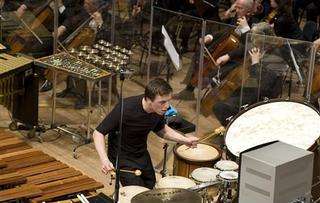|
Back
Nelsons usually impresses, but not this time Lucerne
Kultur- und Kongresszentrum Luzern
08/16/2010 -
Richard Wagner: Prelude to Lohengrin
Avner Dorman: Frozen in Time
Peter Tchaikovsky: Symphony No. 6 op. 74
Martin Grubinger (percussion)
City of Birmingham Symphony Orchestra, Andris Nelsons (conductor)

M. Grubinger (© Lucerne Festival/Georg Anderhub)
Nelsons started this concert simply, I suspect, to remind us that he had been selected by the Bayreuth Festival to conduct Lohengrin. Nelsons started by asking his strings to play as quietly as they could possibly manage, rising gradually to the climax and then returning to the start position within eight minutes, neither a very satisfying nor rewarding musical experience.
Few will have travelled especially to hear the CBSO, but many will travel to hear and watch Andris Nelsons and those who travelled to Lucerne for this concert were also delighted to hear and watch the young percussionist Martin Grubinger in the next piece which was by a young Israeli composer, Avner Dorman. His piece entitled Frozen in time, a concerto for percussion and orchestra, was here given its Swiss premiere. At its premiere in Hamburg in December 2007 there was a standing ovation, not the usual response to a contemporary composition. I suspect however that the ovation was for the performer, not so much the work. The piece was tailored by the composer to the virtuosic gifts of this particular soloist. The work is not inaccessible; it is not modern enough for that. It is wholly tonal and even laid out in the traditional format of three movements, the central one being slow.
Grubinger entered his Perspex cage (shielding himself and his din from the rest of the orchestra) and with a shriek from the drums, he was off bounding around his cage to attack marimbas, xylophone, cowbells and a variety of drums with a beam on his face and hardly a pause for rest. The orchestral accompaniment was irrelevant and, for the most part, utterly forgettable.
Most of the work’s nods are to Broadway musicals (the composer studied under John Corigliano at Juilliard), Gamelan, mellow jazz and grunge. It had plenty of immediate appeal with its jazzy syncopations, bringing to mind Gershwin and Bernstein, especially West Side Story, whilst not having sufficient innate musical interest to hold attention for any length of time.
Grubinger’s encore was a stunning solo display on a side drum, which “piece” he himself described not as music but sport, worthy of any respectable circus.
Andris Nelsons has now been at the helm of the City of Birmingham Symphony Orchestra (CBSO) for two years which ought to be enough to judge the fruits of this partnership. On the evidence of their performance at this early Lucerne Festival concert, whilst Nelsons has, of course, lost none of his style and panache, the CBSO has not transmogrified into one of Europe’s premier orchestras. That would perhaps to be too much to ask. Neither Simon Rattle nor Sakari Oramo really managed it, so why should Nelsons?
The Pathétique, connoting impassioned suffering, should be a devastating affair. It wasn’t. Nelsons was keener on the effect of the moment rather than the structure as a whole and the piece, probably Tchaikovsky’s greatest work, lacked coherence. Fine woodwind could not make up for quite ordinary brass playing and generally the strings lacked warmth, silkiness and tone. Nelsons did display fine control of the very quiet passages in the opening movement (at one stage the score is marked pppppp!), moments later leaping into the air like a jack-in-the-box to whip the orchestra up into a frenzy. The slow movement was an effortless but dull glide through its dance rhythms. It felt like the prelude to the drama of the third movement, which although an Allegro molto vivace had the orchestra struggling to keep up with Nelson’s super-fast tempi. Nelsons adopted two tactics to prevent even this sophisticated audience from applauding the end of the third movement, one of the most famous false stops in classical music, namely by hovering with his arms as if the music was continuing and then launching virtually straight into the final Adagio lamentoso, musically questionable but it did prevent the annoyance and disturbance of applause at the wrong time.
The final two movements were undoubtedly more satisfying than the first two but the work failed to bite as it should, an effect not aided by a Puccini encore.
John Rhodes
|